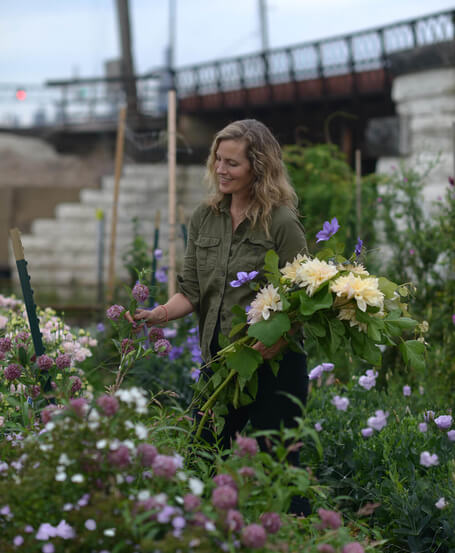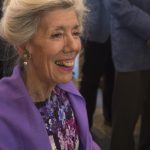
BY JUDY CARMACK BROSS
Chicago: First City of Flowers.
Before Carl Sandburg gave it the epithet “city of big shoulders,” Chicago was for several decades the nation’s flower capital, with hundreds of greenhouses and flowers across the North Side and North Shore. In the early 1900s, roses and carnations were sent from this railroad hub all over the country for weddings, funerals, and other occasions. A 1907 issue of the American Florist magazine estimated that the Budlong Nursery alone housed over 30,000 grafted rose plants, primarily American Beauty and Richmond in variety.

Image credit: Chicago Public Library Northside Neighborhood History Collection.
Cornelia McNamara joyfully follows in the footsteps of those gardeners of a century ago, currently producing magnificent dahlias in pastel and jewel tones, anemones in rainbow colors, ranunculus, and more at her urban farm on the near west side of Chicago and sold by subscription beginning each June.
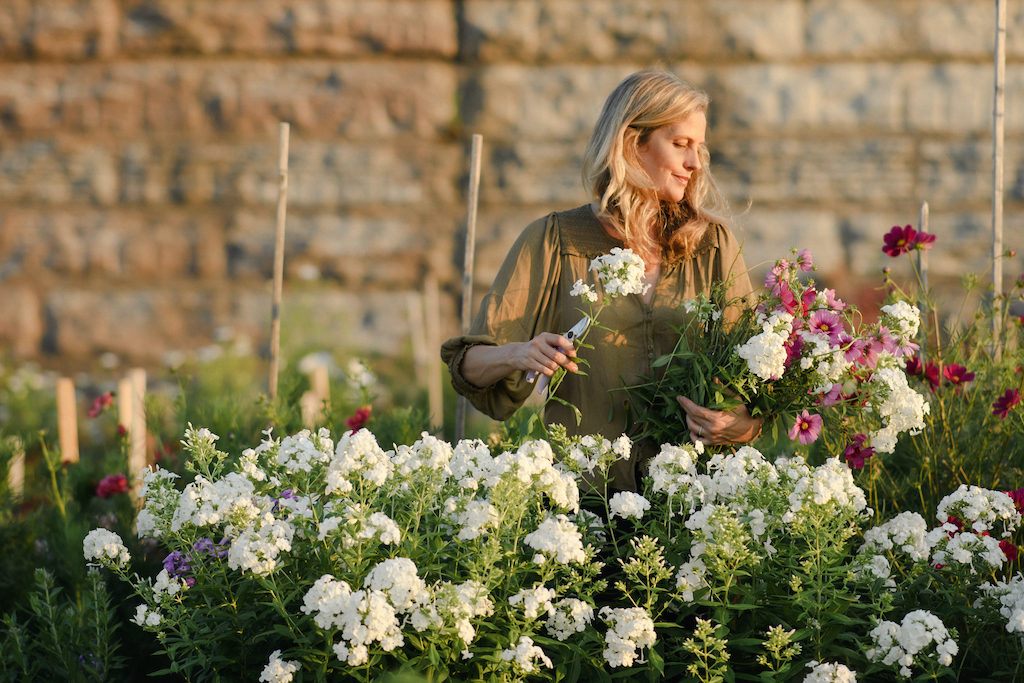
Cornelia McNamara. Image credit: Nancy Beale of Studio This Is.
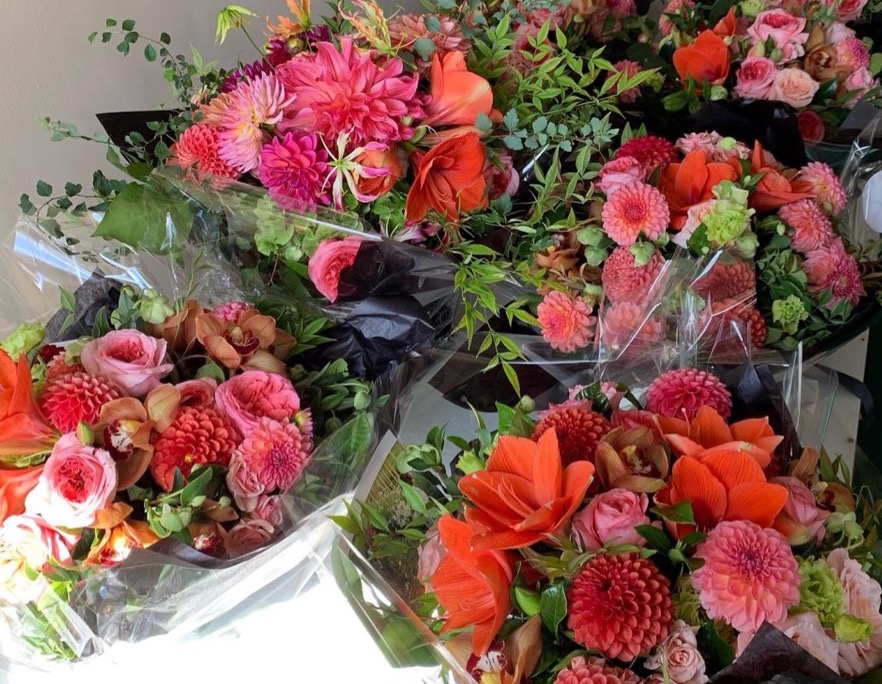
“At Cornelia McNamara Flowers, we have grown our own flowers for the past 10 years as a means to draw down climate change but also because it is fun and they are more beautiful than anything we can buy,” McNamara says. “Inspired by the past, we look to the future as we work in concert with the natural world.”
She continues, “It is with great joy that we have joined the organic flower movement in the United States. Eighty-five percent of flowers sold in the U.S. are grown on other continents and many of them with the use of unregulated pesticides. They also require uninterrupted refrigeration as they journey to our design studios. While supplying us with the most unusual and beautiful flowers, our farm mitigates the astoundingly large carbon footprint of conventionally grown, imported flowers. Best of all, we can provide extraordinary, long-lasting flowers for our clients who love and treasure them as much as we do.”
McNamara’s goal was to secure permanent farm space and sanctuary, which they have through an environmental easement. “City farms date back to ancient Mesopotamia,” she explains. “They can become teaching farms and serve as responses to the inherent stress around us, helping us feel better spiritually and physically.”
McNamara puts the farm to bed in November, when the natural world starts to hibernate, and returns in March when the first daffodils arrive. Starting June 4, they harvest and arrange for their subscribers four consecutive weeks of premium mixed bouquets full of all the gorgeousness early summer has to offer.
Come fall, perennializing dahlias is at the forefront, last year’s effort demanding all of McNamara’s creativity and dedication: “We were able to perennialize 150 dahlias over the winter with 14 inches of leaf mulch, some stable sweepings from our local goat farm, and about 10 burlap bags per plant, removed from the waste stream by Healthy Soil Compost, who picks up 1000 coffee sacks from Intelligentsia Coffee every month. We covered with two large heavy plastic tarps weighed down by bricks.” A big undertaking with a beautiful payoff.

Winterizing dahlias.
A third-generation gardener, she follows in the footsteps of two strong and creative women who were passionate about life and flowers. These generations seem the legacy of the time when Chicago was the first city of flowers: “My grandmother’s family acquired Aloha Lodge in Lake Geneva, which the Drake Hotel family built, naming it in honor of a honeymoon in Hawaii. My grandmother, who was also named Cornelia, had a flower arranging room, and I remember all the beautiful vessels. I have some of her crystal ones and ceramic containers decorated with flowers up the sides. I recall her hedges of hydrangeas and a Shakespeare garden. She died when I was young, but I remember when someone asked how she did her amazing flower arrangements she said, ‘Get the most beautiful flowers, fill your best vase with water, close your eyes and drop in your flowers.”
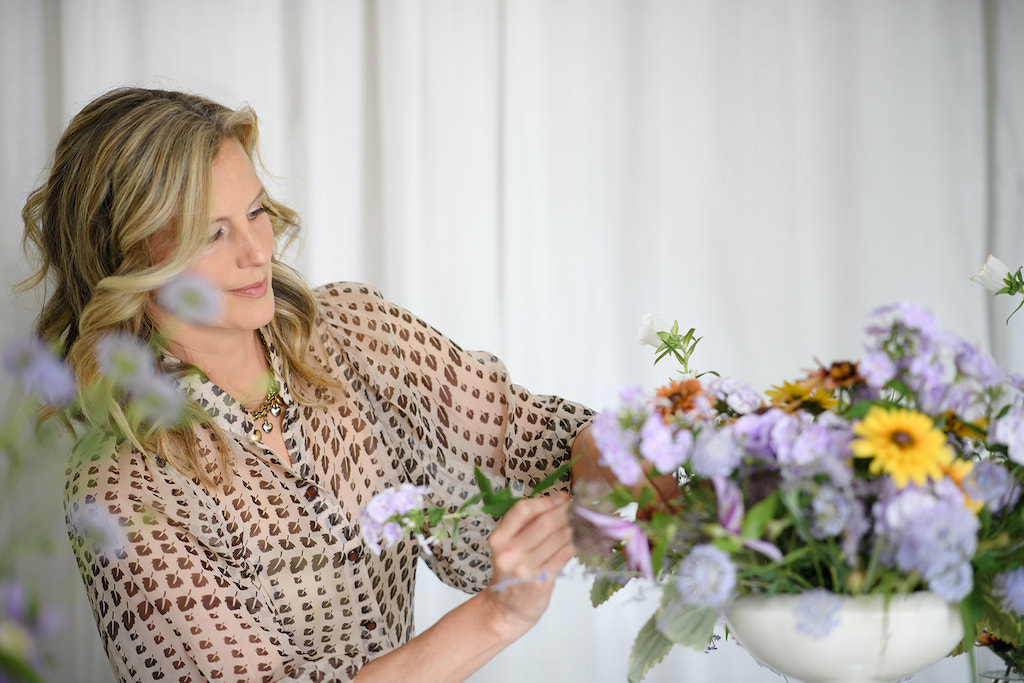
Image credit: Nancy Beale of Studio This Is.
Her mother, Omie Daniels, managed Green Inc. in the 1980s with the legendary Inara Carroll, who still owns the shop today and does a thriving business in Old Town. McNamara remembers visiting the shop when she was little, likening it to walking into a painting.
She also was inspired by seeing both women achieving success, in leadership positions, and doing what they loved: “What fascinating feminists! My mother was very artistic and an activist. She was getting her masters in anthropology at the time on the cultural relevance of the matriarchy. She always liked to remind me that we are only one generation away from our agrarian culture.”
McNamara’s farm is part of the C.S.A. network, which stands for Community Supported Agriculture. “By purchasing locally grown products like produce and flowers, community members can support farmers, habitat for pollinators and urban wild, and their own health in the process,” she explains.
Although McNamara emphasizes that the reason she started the urban farm was for environmental purposes, she describes herself as a “flower pig” who never gets enough flowers in her life. “Flowers really snap you into the present, and their beauty is totally arresting. It is as if they are saying, ‘Take a huge deep breath, here I am in my infinite complexity,’ ” she says.
And the farm’s hyper-local, organically grown flowers help to spread this sense of wellbeing. They are truly in a class of their own, providing almost medicinal qualities, easing stress, and connecting us to the divine, natural world.
Though the 1950s saw a rapid shift from local production, thanks to affordable and reliable air shipping, which also shifted the center of flower production from the center of the country to California and later South America, institutions such as the annual Chicago Flower and Garden Show, started in 1847 as the Chicago Horticultural Society’s “Exhibition of Fruits and Flowers,” the beautiful Lincoln and Garfield Park conservatories, and farms like McNamara’s help return our floral focus back to the Windy City and back to buying local.
To learn more about McNamara’s urban farm and flowers, visit corneliamcnamara.com.



